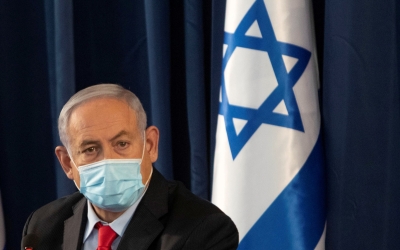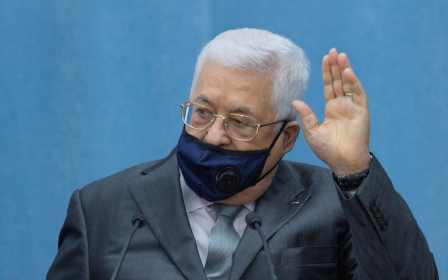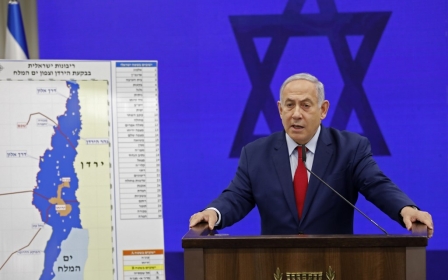Saeb Erekat: Stop treating Israel as a state above the law and end annexation

With only a few days left until 1 July, the date included in the Israeli government coalition agreement to further advance the annexation of occupied Palestinian territory, it has become clear to Israeli Prime Minister Benjamin Netanyahu and US President Donald Trump's team that their next colonial mission will be more challenging to execute.
Worldwide campaigns, a firm position by the Arab world, the prospects of an ICC investigation and unprecedented Congress efforts, as well as the significant grassroots efforts in the US, are all elements that were not taken into consideration when the Trump team drafted Israel's annexation plan.
Even for some of the current US administration's closest allies, such as the pro-Israeli evangelical camp, Israel's annexation is not a priority. Evangelical voices against annexation in the US are growing louder.
Likewise, many leading US Jewish voices have strongly opposed annexation, which if it took place could jeopardise their sacred bi-partisan support for the Israel lobby in Washington. A few days ago, over a hundred Democratic members of Congress signed a letter against annexation, while Democratic presidential candidate Joe Biden has expressed his own opposition to it.
All regional actors, as well as all Arab countries with strong connections in Washington, have warned against Israel’s plans. They have been clear that annexation undermines their national interests.
The secretary general of the Arab League has played an important role in the diplomatic efforts. The European Union has made it clear that annexation will negatively affect its relations with Israel. So, why would the US and Israel keep moving ahead with it?
'Now or never'
Trump and his team have dismissed international law and UN resolutions as tools for peacemaking and have instead endorsed some of Israel's most hardcore views. For the advocates of annexation, this is their historic moment and their short-term goals are clear.
The messianic camp represented by US Ambassador David Friedman deeply feels that this moment will mark their legacy
November's US election is pushing this camp to say: "It's now or never." The messianic cohort represented by US Ambassador David Friedman deeply feels that this moment will mark their legacy.
In their calculations, it is also possible that Israel’s leading trading partner, the European Union, is not going to be able to impose sanctions. They count on governments such as Germany's, which while firmly declaring that annexation is a violation of international law, also called upon the ICC not to conduct an investigation into Israeli crimes.
As Israel continues to reiterate its intentions to annex, no country has yet taken concrete measures such as recalling its ambassador to Israel or summoning Israeli ambassadors to their countries. On top of that, only last Friday, no EU country voted in favour of a resolution in the UN Human Rights Council calling for basic principles of accountability for Israeli violations in Palestine.
Several steps
Our position remains that stopping annexation is doable. Ending Israel's illegal colonial-settlement occupation is also achievable. We have taken several steps with this in mind, including ending all interim bilateral agreements after years of systematic Israeli violations.
Our position remains that stopping annexation is doable. Ending Israel's illegal colonial-settlement occupation is also achievable
A few days ago, thousands of Palestinians were joined by dozens of diplomats in Jericho to say no to annexation and yes to freedom for Palestine: a powerful image that showed the unanimous rejection of annexation outside the Trump-Netanyahu bubble.
UN resolution 3414 of 1975 requested "all States to desist from supplying Israel with any military or economic aid as long as it continues to occupy Arab territories and deny the inalienable national rights of the Palestinian people." In 2004, the International Court of Justice (ICJ) advisory opinion on the annexation wall also included a set of responsibilities for the international community.
If this was implemented, Israel would not be talking today about annexation. The calls for annexation are a reminder for the need for accountability, including sanctions.
Our vision of peace was detailed to the UN Security Council and is based on international law and relevant UN resolutions.
This requires bold steps to reaffirm the international support for this formula, including the recognition of the State of Palestine and to stop treating Israel as a state above the law. An international peace conference has been one of our requests.
Neither Trump nor Netanyahu expected major condemnations or challenges to their annexation plans. But this is an understanding that their actions are not only an attack against the rights of the Palestinian people but about the international community as a whole.
As the world has spoken loudly against annexation, we shall continue working in coordination with international parties, from governments and parliaments to civil society, to stop with concrete measures Israel’s attempts at perpetuating apartheid in Palestine.
The views expressed in this article belong to the author and do not necessarily reflect the editorial policy of Middle East Eye.
This article is available in French on Middle East Eye French edition.
Middle East Eye delivers independent and unrivalled coverage and analysis of the Middle East, North Africa and beyond. To learn more about republishing this content and the associated fees, please fill out this form. More about MEE can be found here.







